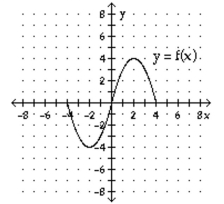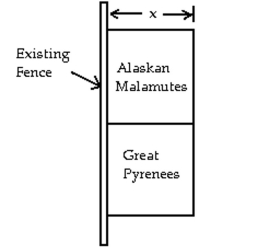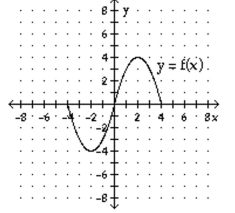Exam 2: More on Functions
Exam 1: Graphs, Functions, and Models189 Questions
Exam 2: More on Functions157 Questions
Exam 3: Quadratic Functions and Equations; Inequalities209 Questions
Exam 4: Polynomial and Rational Functions94 Questions
Exam 5: Exponential and Logarithmic Functions106 Questions
Exam 6: Systems of Equations and Matrices70 Questions
Exam 7: Conic Sections59 Questions
Exam 8: Sequences, Series, and Combinatorics92 Questions
Select questions type
Determine algebraically whether the graph is symmetric with respect to the x-axis, the y-axis, and the origin.
- 18 x=|y|
A) x -axis only
B) Origin only
C) x -axis, y -axis, origin
D) y-axis only
(Short Answer)
4.8/5  (40)
(40)
Determine the domain and range of the function.
-![Determine the domain and range of the function. - A) Domain: (- \infty , \infty ) Range: [-3,3) B) Domain: (-3,3]; Range: ( - \infty , \infty ) C) Domain: ( - \infty , \infty ) ; Range: (-3,3] D) Domain: ( - \infty , \infty ) ; Range: (-3,3]](https://storage.examlex.com/TB34225555/11ec84ef_95be_00e0_9401_671d75f701a4_TB34225555_11.jpg) A) Domain: Range: [-3,3)
B) Domain: (-3,3]; Range:
C) Domain: ; Range: (-3,3]
D) Domain: ; Range: (-3,3]
A) Domain: Range: [-3,3)
B) Domain: (-3,3]; Range:
C) Domain: ; Range: (-3,3]
D) Domain: ; Range: (-3,3]
(Short Answer)
4.9/5  (30)
(30)
The given point is on the graph of y = f(x). Find a point on the graph of y = g(x).
-g(x)=f(x-1)+3 ;(4,13)
A) (5,10)
B) (14,10)
C) (5,16)
D) (14,16)
(Short Answer)
4.8/5  (38)
(38)
For the pair of functions, find the indicated domain.
- Find the domain of f/g
A)
Find the domain of f/g
A)  B) (-6,6)
C)
B) (-6,6)
C)  D)
D) 
(Short Answer)
4.8/5  (30)
(30)
The graph of the function f is shown below. Match the function g with the correct graph.
-g(x)= -f(x)- 3

(Multiple Choice)
4.8/5  (28)
(28)
Answer the question.
-How can the graph of  be obtained from the graph of
be obtained from the graph of  A) Shrink it vertically by a factor of
A) Shrink it vertically by a factor of  Shift it vertically 2 units downward.
B) Shrink it vertically by a factor of
Shift it vertically 2 units downward.
B) Shrink it vertically by a factor of  Shift it horizontally 2 units to the left.
C) Shrink it vertically by a factor of
Shift it horizontally 2 units to the left.
C) Shrink it vertically by a factor of  Shift it horizontally 2 units to the right.
D) Stretch it vertically by a factor of 4 . Shift it vertically 2 units downward.
Shift it horizontally 2 units to the right.
D) Stretch it vertically by a factor of 4 . Shift it vertically 2 units downward.
(Short Answer)
4.7/5  (29)
(29)
The given point is on the graph of y = f(x). Find a point on the graph of y = g(x).
-
(Multiple Choice)
4.8/5  (34)
(34)
Write an equation for a function that has a graph with the given characteristics.
-The shape of is reflected across the y -axis. This graph is then vertically stretched by a factor of 8.8. Finally, the graph is shifted 7 units downward.
(Multiple Choice)
4.7/5  (26)
(26)
Solve.
-Elissa sells two breeds of dogs, Alaskan Malamutes and Great Pyrenees. She has 78 feet of fencing to enclose two adjacent rectangular dog kennels, one for each breed. An existing fence is to form One side of the kennels, as in the drawing below. Let x represent the measurement indicated. Express the total area of the two kennels as a function of x. Graph the function and from the graph determine the value of x, rounded to the hundredths place, that will yield the maximum area.
 A) 19.50 feet
B) 13.17 feet
C) 13.33 feet
D) 13.00 feet
A) 19.50 feet
B) 13.17 feet
C) 13.33 feet
D) 13.00 feet
(Short Answer)
4.8/5  (37)
(37)
Given the function f, match the function g with a transformation of f.
-f(x)= x2 - 7, g(x)= 25x2 - 7
(Multiple Choice)
4.8/5  (43)
(43)
For the pair of functions, find the indicated sum, difference, product, or quotient.
- Find (f/g)(x)
Find (f/g)(x)
(Multiple Choice)
4.8/5  (37)
(37)
The given point is on the graph of y = f(x). Find a point on the graph of y = g(x).
-
(Multiple Choice)
4.7/5  (42)
(42)
The graph of the function f is shown below. Match the function g with the correct graph.
-g(x)= f(x)+ 1

(Multiple Choice)
4.8/5  (34)
(34)
Solve.
-The number G of gears a machine can make varies directly as the time T it operates. If it can make 3000 gears in 6 hours, how many gears can it make in 4 hours?
(Multiple Choice)
4.9/5  (40)
(40)
For the pair of functions, find the indicated composition.
-
Find .
(Multiple Choice)
4.8/5  (38)
(38)
Find the requested function value.
-
Find
A) 106
B) -194
C) 116
D) -1084
(Short Answer)
4.9/5  (30)
(30)
Consider the functions F and G as shown in the graph. Provide an appropriate response.
-Find the domain of FG. ![Consider the functions F and G as shown in the graph. Provide an appropriate response. -Find the domain of FG. A) [-3,4] B) [-1,3] C) [-3,3] D) [-1,4]](https://storage.examlex.com/TB34225555/11ec84e8_f413_a58c_9401_0fece21e3a0a_TB34225555_11.jpg) A) [-3,4]
B) [-1,3]
C) [-3,3]
D) [-1,4]
A) [-3,4]
B) [-1,3]
C) [-3,3]
D) [-1,4]
(Short Answer)
4.9/5  (40)
(40)
For the pair of functions, find the indicated composition.
- f(x)=4 x+15, g(x)=3 x-1
Find
(Multiple Choice)
4.7/5  (38)
(38)
Showing 121 - 140 of 157
Filters
- Essay(0)
- Multiple Choice(0)
- Short Answer(0)
- True False(0)
- Matching(0)